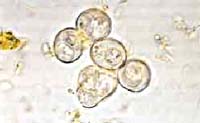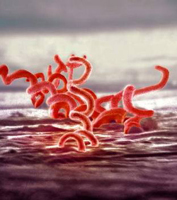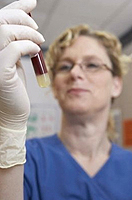In children, chlamydia develops gradually, and the disease is often delayed for months and even years.
Content
What is this disease and why it arises?
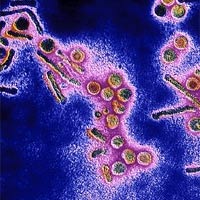 Chlamydia cause bacteria called chlamydia. Three species of chlamydia are known, each of which can lead to the appearance of the disease: Chlamydia Psittaci is common in birds and affect the child and adult in contact with them; Chlamydia Pneumonia causes lung diseases (pneumonia); Chlamydia trachomatis - an infection that causes this pathogen is transmitted by sexual path.
Chlamydia cause bacteria called chlamydia. Three species of chlamydia are known, each of which can lead to the appearance of the disease: Chlamydia Psittaci is common in birds and affect the child and adult in contact with them; Chlamydia Pneumonia causes lung diseases (pneumonia); Chlamydia trachomatis - an infection that causes this pathogen is transmitted by sexual path.
Chlamydia is the bacteria of a very small size, they are not able to produce energy to ensure their life cycle themselves. In order to survive, they set up in healthy host cells and enjoy their energy. That is why chlamydia is called intracellular parasites. They are capable of penetrating the cells of the eye, respiratory tract, in the mucous membrane of the germ glands of boys and girls.
Chlamydia is different from other infectious diseases in that it is difficult to reveal and cure. The fact is that chlamydia has two cellular forms. The first thing when bacterium penetrates the healthy cell and settles there. Absorbing the energy of this cell, it increases in the amount, it is divided and passes into the second form. During this period, identify the disease is very difficult (this is possible only due to special research).
Prowing, chlamydia turn into their original shape again. The whole process of dividing and ripening chlamydia takes from 48 to 72 hours. Then the host cell is broken, chlamydias come out of it and affect the following groups of healthy cells - during this period the first symptoms appear. However, the process of ripening bacteria can stay at any stage. In this case, it is possible that the disease will not show itself even months and years from the moment of infection. Her signs in the form of a long cough, constant runny nose, itching in the crotch area, discharge from the vagina appear only in violation of the protective forces of the body of the kid. It takes a lot of time before it becomes clear that the cause of these violations is chlamydia.
How the disease is transmitted to the kids?
Despite the fact that it is transferred by sexually, the child is infected with chlamydia from the sick mother during pregnancy and childbirth. In the event that the baby gets breast milk and good care, its immune system copes with an infection, suppressing the reproduction of chlamydia to a certain time. The weakening of the body's protective forces allows bacteria to continue maturation and division, and then signs of illness appear.
The time of symptoms of the disease depends on the degree of maturity of the immune system of the kid. For example, to suspect chlamydial infection in externally healthy newborn, it is possible only if his parents have manifestations of the disease: allocations from the vagina, itching in the crotch area, the threat of pregnancy interruption, spontaneous miscarriages.
What does the disease manifest?
If the baby is infected with chlamydia, intrauterine, he begins with a heavy form of pneumonia, which makes itself felt in the first three months after birth. Chlamydia is the reason for the appearance of pneumonia in a third of newborns.
Acute chlamydial infection in newborns and babies up to three years flows in different forms. Most often there are eye diseases - conjunctivitis; nose - mucous-purulent rhinitis; Lungs - Pneumonia. Sometimes several organs are amazed: light, heart, gastrointestinal tract, liver, brain, central nervous system.
Symptoms of brain damage appear early and often remain unnoticed because they have too general. Among them - increased excitability, trembling of hands and feet, painful dare crying, tightening. It takes a lot of time before the parents and watching child doctor will think about chlamydia, as the cause of these disorders, and the disease in the meantime becomes a protracted and chronic.
In children, chlamydia develops gradually, and the disease is often delayed for months and even years. First appear separation from the nose, then the rapid breathing, the bouts of dry cough (the temperature, as a rule, does not increase). If the disease does not start to treat, all these symptoms grow slowly, sometimes decrease, and then without visible causes appear again.
If chlamydia is striking the gastrointestinal tract, bloating, the rice of the abdomen, stool disorders (diarrhea and constipation). Vomiting and tightening say that chlamydia in the kid flows hard.
Is it possible to detect chlamydia?
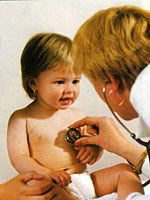 As already mentioned, recognizing chlamydial infection in newborns is difficult, because its symptoms appear early and often remain unnoticed, because they have too general. Often they are taken for the consequences of hypoxia suffered by the baby and / or labor injury, so after discharge from the maternity hospital, such kids are sent under the supervision of a neuropathologist.
As already mentioned, recognizing chlamydial infection in newborns is difficult, because its symptoms appear early and often remain unnoticed, because they have too general. Often they are taken for the consequences of hypoxia suffered by the baby and / or labor injury, so after discharge from the maternity hospital, such kids are sent under the supervision of a neuropathologist.
If specialists have reason to assume that the newborn and his mother are infected with chlamydia, then on the third day after delivery, they conduct a survey: determine the causative agent of chlamydia in the smear of the content of the nasal cavity, conjunctivations, vagina. If the result of the study is negative, but clinical signs of the disease are preserved (conjunctivitis, rhinitis, vulvit, etc.), the study of blood for immunoglobulins is carried out.
The fact that the disease is at the acute stage of development, says an increase in the child's blood immunoglobulins of all three classes (IGA, IGG, IGM). If it has become chronic, research will show the level of IGA level, IgG. The determination of the level of immunoglobulins in the blood is the main method of diagnosing infection and treatment control. However, it is effective only if the study is carried out not one, but several times, in different time intervals, for which parents of sick children do not always agree. Meanwhile, only repeated laboratory tests for the appointment of the doctor allow and diagnose and evaluate the effectiveness of treatment.
The immune system of the child, like an adult, reacts to any infection of the production of a special substance capable of destroying bacteria. These substances are called immunoglobulins, or antibodies. For their education, time is necessary, so only two weeks after infection with chlamydia in the child's blood antibodies appear. Therefore, their absence does not mean that the baby has no chlamydia. If the child has become infected during childbirth, they will appear only after 3-4 weeks, which is why the re-examination is necessary.
Urogenital chlamydia is difficult to detect both moms. The fact is that this can be done only in certain phases of the menstrual cycle. In the smear of the discharge vagina or cervix, chlamydia are determined from the 10th to the 26th day. During the remaining periods, the probability of identifying chlamydia is small.
Rules of hygiene and safety:
- Kids should not be in the parent bed.
- If you want to climb a child, kiss it only in the ass.
- Be sure to highlight the baby separate towel, washcloth.
Chlamydia live inside the cells, so they are resistant to the action of antibiotics. Some of them can only suspend the division of chlamydia for a long time, but then when the disease appears again, its pathogens will become resistant to the action of this antibiotic.
So that the treatment of chlamydia was effective, you need to choose the right to choose drugs and the time when they need to be taken. Otherwise, the disease can become chronic and for several years in the blood of the kid will circulate its pathogen? If periods of exacerbation of the disease are repeated, experts appoint additional treatment courses. Unfortunately, in whatever form, chlamydia in a child, acute or chronic, he entails heavy complications - primarily the weakening of the immune system and infertility.
Is it possible to prevent the spread of urogenital chlamydia?
Since this disease is transmitted by sexually, adults need to use protective equipment. The main means of the prevention of chlamydia remains a condom.
Commary in chlamydia is worth all women who plan to start children. This is important not only for the security of the future child, but also for the health of mom. The fact is that over time, chlamydial infection can provoke the development of oncological diseases. Kids, infecting, become lifelong carriers of chlamydia, and sooner or later infection «Visitious». If this happens during puberty, the result of a long-term course of the disease can be infertility.
In the survey on chlamydia, there are primarily women need (regardless of whether they are pregnant):
- with inflammation of genitals;
- infertility for 1-3 years;
- Threat to the abortion of pregnancy, miscarriages, premature childbirth, multi-way.



